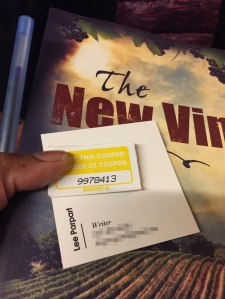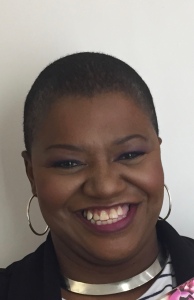by Deborah Joy Innes
 I was the very lucky winner of two (yes, two!) raffle prizes at the Editors Toronto meeting in September.
I was the very lucky winner of two (yes, two!) raffle prizes at the Editors Toronto meeting in September.
The first was the book The New Vine by author Robert Marrone. There were two authors present that night (Robert Marrone and Trevor Cole), along with their editors, speaking about the author-editor relationship.
The second was the last prize of the evening: a one-hour mentoring session with Jennifer D. Foster—editor, writer, mentor, co-chair of Editors Toronto, and administrative director of Rowers Reading Series.
Embarrassed as I was to have won two prizes, the timing of the mentoring session was perfect. (The book set in Italy was also very good.) I’d recently lost my job after 10 years as an in-house copy editor, proofreader, and writer in a legal marketing and communications department. I was now in the process of setting up my freelance copy-editing business. I had many questions.
 Connecting with my mentor
Connecting with my mentor
Jennifer and I connected through email and then picked a date in October for the one-hour session. We agreed to do it over the phone as Jennifer was very busy with client projects and deadlines.
I sent Jennifer a list of six or seven topics that I was interested in discussing, including
contracts, rates, quotes, accounting, my website, and self-publishing authors. She asked me to select two or three topics from my list and prepare a few questions for each one.
I also sent her a few short paragraphs about myself to save us a little time on introductions when the day came.
 The session
The session
I felt well-prepared for the session on that sunny October morning. I sat at my kitchen table with my laptop open, my list of questions ready on the screen, a cup of coffee in my hand.
Following are just some of the questions, answers, and comments from our hour-and-a-half conversation.
Deborah—a question about quotes
In the summer, I was approached by a self-publishing author to copy edit his manuscript. It was my first time providing a quote, and if he accepted my offer, it would also be my first time editing a manuscript. Because the author was young, I made assumptions about his budget. And because I’d never tackled a manuscript before, I thought it only fair to quote a very low flat fee. What do you think?
Jennifer: You are running a business. You are not doing favours for people. You have to be confident and project a professional image. I understand having to take lower-paying jobs every now and then, but don’t consistently undercut yourself because that undercuts the whole industry. Don’t be afraid to turn people down if they’re not willing to pay you what you’re worth. We’re aiming to maintain an industry standard, and as members of Editors Canada, we’re representing the organization in the way we conduct ourselves as professionals.
Deborah—a question about manuscripts
What should I advise self-publishing authors to do before they move to the copy-editing stage? The manuscript from my self-publishing author didn’t appear to need a structural or stylistic edit, but it might have. The author wasn’t aware of the different stages of editing—nor would I necessarily expect him to be—so I sent him the link to Editors Canada’s Definitions of Editorial Skills.
Jennifer: If you’re working with a self-publishing author, ask them if the manuscript has been submitted for evaluation by a professional evaluator and/or sent to a beta reader. If not, hopefully you can recommend some reputable ones for the writer to approach. It’s important for a manuscript to be evaluated first, and then it should be followed by the editing.
Deborah—a question about accounting
How are you handling the financial side of your business? Do you use a particular software for invoicing and accounting?
Jennifer: I do the invoicing myself, and I have a professional handle the taxes/financials. If you’re not skilled with the numbers side of running a freelance business, then hire someone who is an expert in that field—if you’re able to afford it. It’s not easy trying to figure out how to run your own freelance business, how to market yourself, get clients and learn/juggle the financial side of the business. Simplify as much as possible to take the stress off of your freelance business.
Jennifer—a comment about finding your own work style
Don’t fight with yourself. Accept the way you are in your work style and the way you approach work. If you’re more of a night person, work at night; if you’re more of a morning person, work in the morning. Do whatever it is that’s going to help you get through the day and be happy and successful.
Deborah—a comment about the benefits of working in-house
Since being off work, I’ve noticed how much I miss the daily social interaction with colleagues. And while I’m excited and committed to starting my own business, working in-house has many benefits, including not having to hunt for clients and not having to learn the financial side of the organization. Phase one of my plan is to work full-time while I grow my business, then I’ll evaluate and decide what’s best.
Jennifer: Freelancing is not for everybody. Some people like having a nine-to-five job, where they can just go in, do the work that’s put in front of them, and leave at the end of the day. And that’s fine; you just have to know what kind of person you are. Also, one of the many benefits of being an Editors Canada member is attending branch meetings, which offer time for professional development, socializing, and networking.
The takeaway: Mentors are invaluable—and I need one
By the end of the excellent and information-filled session, I recognized the incredible value of mentors. Jennifer was succinct, practical, and honest when answering my questions. She also passed along sage advice about freelancing as a whole. While I was focused on the details, Jennifer zoomed out and showed me a wider perspective. I can’t thank her enough. And she gave me an extra half hour of her time, which was very generous.
I also recognized that I needed a mentor—particularly to learn how to provide quotes. Jennifer encouraged me to apply to the John Eerkes-Medrano Mentorship Program, offered by Editors Canada.
I plan on following her advice and doing just that.
Deborah Joy Innes is a copy editor, proofreader, and writer with more than 10 years’ experience. Her editorial areas of interest include legal industry news, legal history, race, class, gender, feminism, LGBTQ+ content, film, dance, and theatre.
This article was copy edited by Gagandeep Bimbh.
